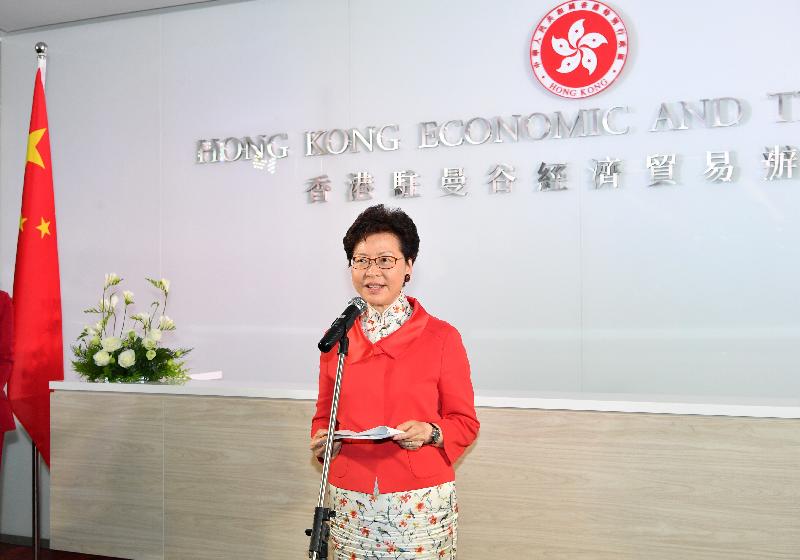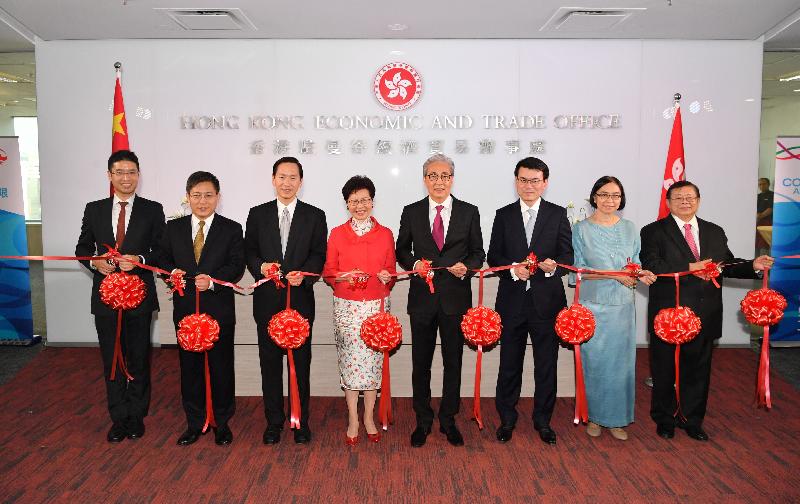Speech by CE at Memorandum of Understanding Signing Ceremony of Bangkok Art and Culture Centre and Zuni Icosahedron in Bangkok (English only)
Following is the speech by the Chief Executive, Mrs Carrie Lam, at the Memorandum of Understanding (MoU) Signing Ceremony of Bangkok Art and Culture Centre and Zuni Icosahedron in Bangkok today (February 28):
Pawit (Director of Bangkok Art and Culture Centre, Mr Pawit Mahasarinand ), Danny (Creator and Curator of Tian Tian Xiang Shang and Co-Artistic Director of Zuni Icosahedron, Mr Danny Yung), ladies and gentlemen,
Good afternoon. It’s a great pleasure to be here today to celebrate with you the launch of a year-long collaboration between Hong Kong’s Zuni Icosahedron and the Bangkok Art and Culture Centre (BACC).
It is a remarkably good fit, connecting Zuni, one of Hong Kong’s major performing arts groups since its founding in 1982, and the Bangkok Art and Culture Centre, Bangkok’s stunning centre for contemporary arts and culture. I’m told that more than 1.7 million people visited the Centre in 2017 or an average of 5,000 a day.
Given the Centre’s international renown and its growing role in Thai arts and culture, I’m confident that this inspired collaboration between Hong Kong and Thailand will be a memorable one – connecting artists and cultural communities, creating lasting bonds, and helping us all excel.
While it is our first collaboration between Zuni and the BACC, Zuni has a long and successful history of international cultural exchange and co-operation. Its Tian Tian Xiang Shang exhibition has been showcased at cultural festivals and public spaces around the world, from Singapore, Shanghai, Toronto to Tokyo, Mexico City, Milan, Washington D.C. and many other global cities. Indeed, more than two million people have enjoyed Tian Tian exhibitions and the multicultural dialogue they stimulate.
The Bangkok Tian Tian exhibition will begin outside at the expansive piazza, with the inclusion there of two Tian Tian sculptures, each six metres high. Inside, you’ll find 100 Tian Tian figurines created by artists from Hong Kong and Thailand. And I’m told that many of these will be created during the exhibition period by the visiting members of the public, children included. I am sure our Thai friends will enjoy this exhibition.
In the coming year, this welcome co-operation will feature the performing arts programme "One Table Two Chairs" and the visual arts exhibition "Stage is Cage/Cage is Stage," as well as a Belt and Road Cultural Forum and an ASEAN Cultural Think Tank research programme. Performing arts’ workshops and artist talks will also be featured.
Cultural cooperation, of course, has long been a hallmark of Hong Kong-Thai relations. Indeed, Hong Kong artists participated in the inaugural Thailand Biennale, a four-month international showcase of contemporary art set outdoors amid the sublime scenery of Krabi province. That exhibition ends today.
And it was one year ago today that Thailand and Hong Kong inked a MoU on Cultural Co-operation. The agreement was signed by Thailand’s Minister of Culture and our Secretary for Home Affairs here in Thailand. On that occasion, our team brought nine talented young Hong Kong musicians, who staged a well-attended concert at the Chinese Culture Centre.
A year earlier, in March 2017, the Thai Minister of Culture visited Hong Kong, touring some of our cultural facilities, including the West Kowloon Cultural District, one of the world’s biggest cultural projects. I’m pleased to say that, since the Minister’s visit, the Cultural District has come a long good way. In January this year, the Xiqu Centre was officially opened. Dedicated to Chinese opera, it’s the first major performing arts centre to open in West Kowloon. It will be followed, later this year, by Art Park and the Freespace outdoor performance venue. In 2020, West Kowloon’s M+ Museum, with its spotlight on visual arts of all kinds, is scheduled to open. And in 2022, the Hong Kong Palace Museum will open its doors, bring to its visitors artefacts of Chinese art and culture from the imperial collection of the Palace Museum in Beijing.
In short, ladies and gentlemen, Hong Kong’s art and cultural scene is blooming. There is a lot of potential for Hong Kong and Thailand to strengthen our close ties in art and culture, and I am sure that is exactly what we are going to do with your support.
I'm grateful to the Bangkok Art and Culture Centre and Zuni for this inspired collaboration, for helping Thailand and Hong Kong find creative new ways to come together, to connect and excel. I look forward to many more pleasant surprises from our collaboration with Thailand. I wish this collaboration every success. Thank you very much.

